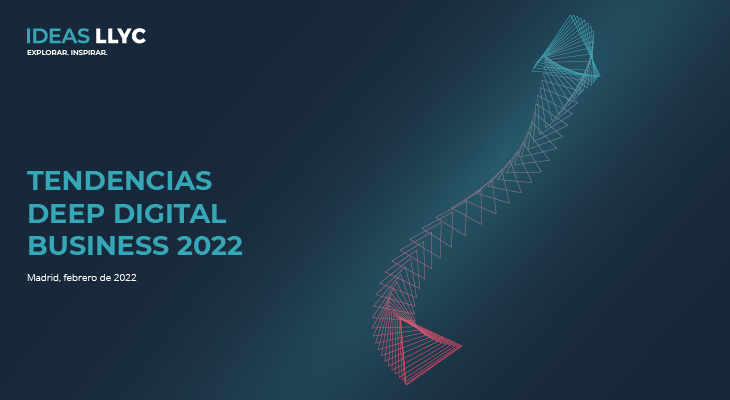The need to digitalize businesses has been brought forward over the last two years due to the impact of the pandemic. In this context, in 2022 we are expected to witness the consolidation and universalization of certain trends that have begun to emerge recently and that accelerated as a result of COVID-19, while we see a major boost to the development and application of new technologies to businesses, marketing and communication.
“Due to the exceptional circumstances we have gone through over the last two years, we have taken some giant steps as a society in terms of the adoption of a digital awareness that would have taken more time to acquire under normal circumstances. This will lead to the enhanced acceleration of the digital transformation over time, and hence we expect to witness some significant disruptions in this matter in 2022”, stresses Alejandro Domínguez, Senior Director of Digital Business at LLYC Europe.
The Deep Digital Business Trends 2022 report, prepared by LLYC, identifies 10 of the main aspects that will mark the digital transformation of companies and institutions this year:
1. AI for good relations: For all those who work in marketing and communication, artificial intelligence offers the ability to look further, to understand the very different realities of each of their stakeholders and find customized responses. This is a very powerful tool for defining strategies and on the impact of our actions.
2. Democratization of data: Only 5% of people are satisfied with the collection and analysis of data performed by their marketing and communication department. COVID-19 has enhanced the need to make these channels more effective within companies to make valuable information available more quickly.
3. No cookies, no party: We will see business models develop to create information that is not based on cookies, and that is more transparent and cleaner. For example, through personality tests. The major commitment of brands is to create powerful first party data that counteract the deficiencies faced in prospecting new audiences.
4. Metaverse. Immersion in the future: The CEO of META, Mark Zuckerberg, stresses that in 10 years’ time, we will no longer “browse” or “look at” the Internet, what we will do is “live” in it. The pillars of what will prop up the Metaverse are being laid by many people in a collective movement that reminds us of the start of the Internet at the end of the 1990s.
5. From the digital era to the quantum era: A quantum computer allows us to process, through statistical possibilities, incalculable volumes of information at an exponential speed. Powerful technology giants like China, the USA, Russia and the EU are already investing large sums of money in the research and development of this technology.
6. Fluid audiences: Tik Tok has shown that conduct has ceased to belong to just a single demographic/psychographic profile and more to individual positions. The concept of an audience that is not defined by age or gender but by attitude and the community to which people belong is part of the future way of understanding communication.
7. Multi cloud-architectures: The cloud has now become more than just a tool to store information. Hybrid and multi-cloud architectures allow for greater innovation and automation, more security, reliability, flexibility and profitability. This is one of the many allies of technology teams to take the intelligence capabilities of companies to new limits.
8. The time for inclusive marketing: The debate is no longer as to whether technology is good or bad, but rather as to how we should reduce digital gaps. Digital marketing must go a step further and focus on the inclusion of all people. Inclusive marketing thinks about all people and not just the majority. Diversity is included in the big picture.
9. Technology in (and for) talent: The search for and retention of digital talent is one of the greatest problems facing human resources departments in companies. These professionals may not have a traditional curriculum or even be job-seekers. We need to go further to reach them.
10. Deep Digital (& Social) leadership: Digitalization is not only changing the way companies operate but also the way in which they are run. A transforming leadership requires them to think, act and react in a different way and, in terms of communication, this is leading us toward more transparent models with greater dialogue and leaders that actively participate in the digital chatter.



